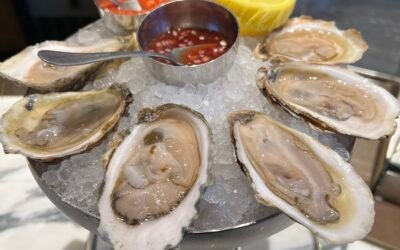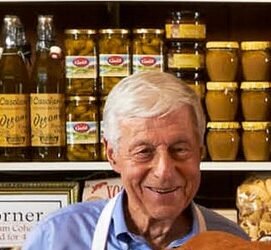Getting to know baker Quentin Berthonneu via Instagram and Facebook, we featured some of his bread here. The French-born baker has traveled and worked around the world. This past year opened his own artisinal bakery in Melbourne’s legendary Prahran Market. Recently, we invited Quentin for a digital sitdown in our kitchen. Besides sharing details of his latest venture, Q Le Baker, he gave insights on baking in today’s world. Here’s a transcript of our conversation.
How and where did you start baking bread?
I started baking in my hometown of Cholet when I was 15 years old. I wanted to do something else than just going to school and study. There’s something very rewarding when you’re 15 and you get up earlier than everyone to start baking bread for a sleeping city.
Describe your favorite tasting bread?
That’s a hard question. I used to be a big fan of baguettes, and I still love them. They’re one of my favorite bread but now I realize that it all depends on what your cooking/eating. I love our Fruit loaf with cheese and I love our chocolate loaf with butter and jam in the morning! The whole-meal miche is also very versatile and a perfect table loaf.
You once wrote that you “can hear when bread dough is ready while it’s mixing.” Can you describe that sound from the Petrin (mixer)?
Ah! That sounds less arrogant when I first wrote it. (he laughs) But, yes, sometimes I do find myself telling the guys to stop the mixers, because if I can hear the dough slapping on the sides of the mixer, it tells me that the gluten is developed enough.

Tell us this; if one recipe is given to ten bakers, will each bread be different?
Definitely ! Especially if they are using pure organic flours or sourdough. Those don’t forgive. And that’s what makes baking great. You will never eat the same bread twice. And we should share our knowledge and recipes since it will never be the same.
Even with a recipe, where the ingredients drive the baker? Or is baking more sensory than science?
Both. It is sensory-driven but a scientific knowledge is required to make the calls. Without knowing exactly how each component works – and how they change through time from temperatures or more – it would be impossible to make the right call.
What’s your method of developing a formula; weights, ingredients, mixing or taste?
Most of the time it comes through knowledge of the ingredients and some research. We never invent anything; rather we look at different recipes, then change them based on what we are trying to achieve and the ingredients we are using.
Can you describe your Kingbrot? Or the Ginger Beer Fruit Loaf? It seems they’re integrated with fermented product, yogurt and ginger beer.
Ah, funny that you ask about the most complex breads we do here.The Kingbrot was actually inspired by Thomas Terri-Chambelland who has a video on YouTube where he makes something called “sexkernbrot.” I’m not even sure of the spelling. And a “sechskornbrot.” I made them once and thought the bread was amazing. I then changed some ingredients to suit my taste, and my customers. A lot of people were asking for 100-percent rye, so we changed it to 60-percent rye and 40-percent whole-wheat. I also changed the water with some homemade yogurt which gives it a sweeter flavor and a nicer crumb texture.
For the Ginger Beer Fruit Loaf, I started making ginger beer at home. Realizing how easy it was, I thought it could be fun to soak our fruits with it. I also realized that my fermentation was very active in the fruit loaf. I wonder if the ginger beer feeds itself on the organic fruits and also ferments the bread. It’s definitely the best sourdough fruit loaf I have ever made. Or tried!
Your bakery is a retail bakery. Is that for quality control or quality of life?
For both; it is important to me that our team doesn’t start too early, but we also don’t want to start baking our bread too early, which would lose freshness.
I have heard that you will be offering workshops. Is it to educate your clients, or more for home bakers?
I am not sure yet about what kind of workshop I want to do. It might be hard to keep a customer for more than three hours at the bakery, so we would have to make some simple stuff. But a homemaker would be ready to take a two-day course in order to learn a lot; so that’s definitely something that we are thinking of.
How did you decide to emigrate to Australia?
I wanted to learn a different language and then, searching online, I found a job in Melbourne. I ended up giving that job away to my friend Brice Antier, who was traveling with me at the time. Then Brice, within a week, got me a job at the famous Vue de Monde. I got very lucky.
What do you think of the bread culture down in “Oz?”
The industrial bread is very bad here, but the artisan bread is next level. Not so much aesthetically but ethically. Most artisans only use sourdough, only use organic flours, and bake with some basic equipment. It’s quite beautiful to see.
Is it difficult to find good flour or an audience of like-minded bread eaters?
It is definitely difficult to find good flours in Australia. In France, you have so much choice and most of the millers do it very well with a full range. Here you’ll find big companies doing it consistently but with a lack of flavor and nutrients. Or you find farmers milling their ore grains (which is the freshest and the best to support a local business) but they’re usually expensive, logistically harder to deal with, and inconsistent. But I still go for the farmers; they’re the one we should be supporting!
How about France? Is it still the heart of baking?
I do think that France is losing its title as the country of the best bread. While I am pretty sure that France sells more bread than other nations, that’s probably through culture rather than quality. The quality is going down and a lot of artisans from other countries are changing things at an incredible speed. There are bakeries opening with just pastries – known as LUNE – or just bakeries selling whole meal products freshly milled flour – known as SEYLOU. We still bake and operate in France the same way we did 20-years ago. It’s risky for the bread future in France.
Are you considering writing a book on bread?
I would consider a book but only later. Now my focus is on forging the business into something that inspires.
When you’re not baking, what do you do for fun?
Funny question. I haven’t had too much time recently, but I love going camping. Cooking a great meal over an open fire is as rewarding as baking with organic flour and sourdough.













“You will never eat the same bread twice.” I like that.